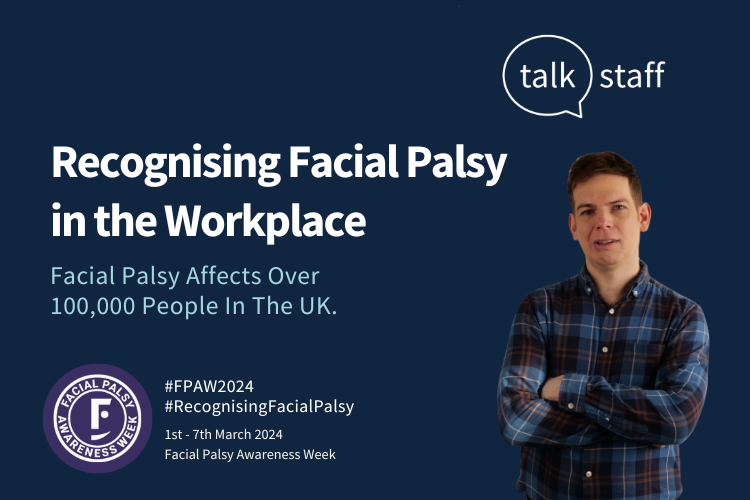
Introduction: A Personal Journey to Wider Recognition
In the heart of our society, and particularly within our workplaces, lies the opportunity for profound understanding and compassion. This Facial Palsy Awareness Week 2024, we’re spotlighting a condition that demands our attention yet often flies under the radar: Facial Palsy. At Talk Staff, this topic hits close to home, as our CEO & Co-Founder, Gary Parsons, has lived with the impacts of Bell’s Palsy for over two decades. His journey from confusion and isolation to finally receiving the support he deserves underscores this year’s theme: “Recognising Facial Palsy.” It’s more than a medical condition; it’s a call to action for employers everywhere to foster a supportive and inclusive work environment for those affected.
The Reality of Facial Palsy in the Workplace
Facial Palsy, including its most common form, Bell’s Palsy, can thrust individuals into challenging new realities, particularly in the workplace. Beyond the physical symptoms—like facial asymmetry, difficulty speaking, eating, and blinking—lies a less visible, yet equally debilitating, psychological toll. Employees returning to work after a Facial Palsy diagnosis may battle anxiety, self-consciousness, and a sense of isolation.
Employers play a critical role in their journey. Understanding and accommodating these challenges can significantly impact an employee’s recovery and mental health. But where to start?
Creating an Accommodating Workplace: A Step-by-Step Guide
1. Awareness and Education: Begin with awareness. Educate your team about Facial Palsy—its symptoms, causes, and impacts. Awareness fosters empathy, breaking down the barriers of misunderstanding and prejudice.
2. Flexible Working Arrangements: Offer flexible working hours or the option to work from home. For someone struggling with recovery, these accommodations can be a lifeline, reducing the stress of commuting and providing a comfortable environment to work in.
3. Open Communication Channels: Keep lines of communication open. Encourage employees to express their needs and concerns without fear of judgment. Regular check-ins can help you gauge their comfort levels and adjust support as needed.
4. Tailored Support Systems: Each case of Facial Palsy is unique. Some may need physical modifications, like ergonomic office equipment or software that aids communication. Others might benefit more from schedule adjustments or mental health support services.
5. Inclusive Policies and Training: Develop inclusive policies that specifically address the needs of employees with medical conditions like Facial Palsy. Train managers and HR personnel to implement these policies with sensitivity and understanding.
Beyond the Workplace: The Psychological Impact and the Power of Support
The journey with Facial Palsy is not just physical; it’s deeply emotional. Gary Parsons’ story exemplifies the long-term effects of lacking support. Misunderstood and underestimated, the psychological scars from his early years of coping with Bell’s Palsy lingered well into adulthood. It’s a stark reminder that the path to recovery extends beyond medical treatment; it requires emotional and social support, too.
Employers can be pivotal in this respect. By acknowledging the psychological impact, offering professional mental health resources, and promoting a culture of inclusion, companies can help employees like Gary find not just treatment, but acceptance and understanding.
List of Conditions Leading to Facial Paralysis
While Bell’s Palsy is prevalent, several other conditions can lead to facial paralysis, including:
- Lyme disease
- Stroke
- Tumors affecting facial nerves
- Ramsay Hunt syndrome
- Congenital conditions
Understanding the variety of causes underscores the importance of a tailored and compassionate approach in the workplace.
Conclusion: A Call to Action for Employers
As we observe Facial Palsy Awareness Week 2024, let’s commit to more than just recognition. Let’s pledge to act—to create work environments where individuals like Gary Parsons are recognised, supported, understood, and valued. It’s time for employers to step up, to educate themselves and their teams, and to implement policies that truly accommodate the needs of all employees, regardless of their medical conditions.
In doing so, we not only honour the spirit of this year’s theme but also move closer to a society where every person, affected by Facial Palsy or not, can thrive in their professional and personal lives.
FAQs About Facial Palsy and Employment
- What is Facial Palsy?
- A medical condition resulting in the weakness or paralysis of the facial muscles, impacting one side of the face typically.
- How can employers support employees with Facial Palsy?
- By providing flexible working conditions, ensuring open communication, offering tailored support, and fostering an inclusive workplace culture.
- What are the psychological impacts of Facial Palsy?
- They can include anxiety, depression, self-esteem issues, and social isolation.
Remember, recognising Facial Palsy is just the beginning. Let’s make our workplaces beacons of empathy, understanding, and support.
Facial Palsy UK is a beacon of hope and support for individuals navigating the complexities of facial paralysis, including those in the workforce. This remarkable charity not only champions awareness and understanding of Facial Palsy but also offers invaluable resources for both employers and employees.





